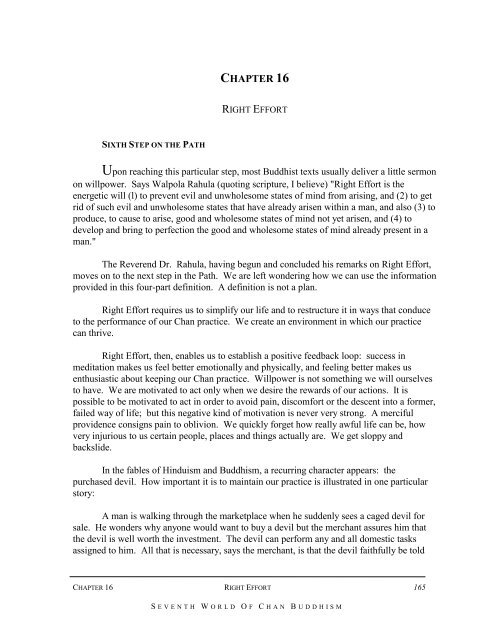seventh world of chan buddhism - Zen Buddhist Order of Hsu Yun
seventh world of chan buddhism - Zen Buddhist Order of Hsu Yun
seventh world of chan buddhism - Zen Buddhist Order of Hsu Yun
You also want an ePaper? Increase the reach of your titles
YUMPU automatically turns print PDFs into web optimized ePapers that Google loves.
SIXTH STEP ON THE PATH<br />
CHAPTER 16<br />
RIGHT EFFORT<br />
Upon reaching this particular step, most <strong>Buddhist</strong> texts usually deliver a little sermon<br />
on willpower. Says Walpola Rahula (quoting scripture, I believe) "Right Effort is the<br />
energetic will (l) to prevent evil and unwholesome states <strong>of</strong> mind from arising, and (2) to get<br />
rid <strong>of</strong> such evil and unwholesome states that have already arisen within a man, and also (3) to<br />
produce, to cause to arise, good and wholesome states <strong>of</strong> mind not yet arisen, and (4) to<br />
develop and bring to perfection the good and wholesome states <strong>of</strong> mind already present in a<br />
man."<br />
The Reverend Dr. Rahula, having begun and concluded his remarks on Right Effort,<br />
moves on to the next step in the Path. We are left wondering how we can use the information<br />
provided in this four-part definition. A definition is not a plan.<br />
Right Effort requires us to simplify our life and to restructure it in ways that conduce<br />
to the performance <strong>of</strong> our Chan practice. We create an environment in which our practice<br />
can thrive.<br />
Right Effort, then, enables us to establish a positive feedback loop: success in<br />
meditation makes us feel better emotionally and physically, and feeling better makes us<br />
enthusiastic about keeping our Chan practice. Willpower is not something we will ourselves<br />
to have. We are motivated to act only when we desire the rewards <strong>of</strong> our actions. It is<br />
possible to be motivated to act in order to avoid pain, discomfort or the descent into a former,<br />
failed way <strong>of</strong> life; but this negative kind <strong>of</strong> motivation is never very strong. A merciful<br />
providence consigns pain to oblivion. We quickly forget how really awful life can be, how<br />
very injurious to us certain people, places and things actually are. We get sloppy and<br />
backslide.<br />
In the fables <strong>of</strong> Hinduism and Buddhism, a recurring character appears: the<br />
purchased devil. How important it is to maintain our practice is illustrated in one particular<br />
story:<br />
A man is walking through the marketplace when he suddenly sees a caged devil for<br />
sale. He wonders why anyone would want to buy a devil but the mer<strong>chan</strong>t assures him that<br />
the devil is well worth the investment. The devil can perform any and all domestic tasks<br />
assigned to him. All that is necessary, says the mer<strong>chan</strong>t, is that the devil faithfully be told<br />
CHAPTER 16 RIGHT EFFORT<br />
S EVENTH W ORLD O F C HAN B UDDHISM<br />
165


